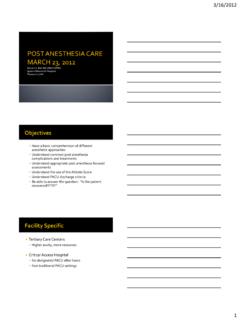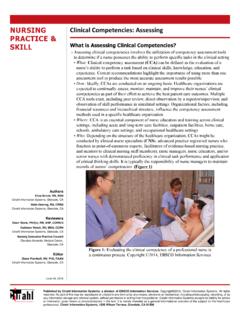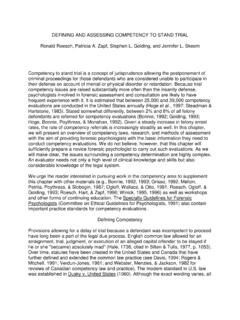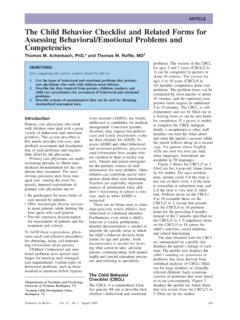Transcription of Behavioral Health Competencies Knowledge, Skill, Attitudes
1 Behavioral Health CompetenciesKnowledge, Skill, AttitudesW I L L I A M G U N N P H DN H B E H AV I O R A L H E A LT H S U M M I TD E C E M B E R 1 1 , 2 0 1 8 GoalsDescribe the activities needed to provide biopsychosocial care and services in the communityDescribe Behavioral Health Competencies for Behavioral Health providers in primary careDescribe the kinds of training and supervision needed to support these functionsKey Aspects of this ModelPatient and Family at the CenterEveryoneinvolved has a role to play in addressing Health including Behavioral healthThe Coordinationbetween the roles as critical than the roles themselvesLeadership clinical , Operational and FinancialEmergency Room Utilization ProjectDr. Andy Valerasand team at the Family Health Center in ConcordHow can we improve our care to reduce unnecessary ER visits?Use of the UPOC urgent plan of care impact on patients, medical assistants and on call providersThe Need for Specific TrainingPaucity of TrainingMost mental Health providers do not have background or specific training to practice in integrated settings (Serrano et al.)
2 , 2018). Impact of No TrainingUntrained MHPs tend to develop traditional MH services in primary care, rather than truly integrated care practice Necessary AdjustmentsWork in fast paced, team-based care settingsDevelop new skills for successful collaboration & same-day access, (Dollar et al., 2018). Dollar, K. M., Kearney, L. K., Pomerantz, A. S., & Wray, L. O. (2018). Achieving same-day access in integrated primary care. Families, Systems, & Health , 36(1), 32-44. , N., Cos, T. A., Daub, S., & Levkovich, N. (2017). Using standardized patients as a means of training and evaluating Behavioral Health consultants in primary care. Families, Systems, & Health , 35(2), 174-183. IPC Really That Different from Mental Health ?IPCMH Specialty LocationPC Clinic A differentfloor, building, sitePopulationFull population in primarycareMost with moderateto severe MH concernsInter-Provider CommunicationCollaborative ,ongoing, & consultative Using PCP method of choiceConsult reportsCPRS NotesService Delivery Structure20-30 minute appointments Limited number (mean: 2-3)50-90 minutepsychotherapy sessions; 14 weeks or moreApproachProblem-focusedSolutionOrien tedVaries by therapyDiagnosis focusedTreatment PlanLeaderPCP continues to leadMHProvideris leadPrimary FocusSupport overallhealth of Veteran/PopulationFocus on functionCure or ameliorate MH symptomsTermination and Follow-UpResponsibility remains with PACT/PCMHMH Provider remains person to contact if neededRowan, A.
3 B., & Runyan, C. N. (2005). A primer on the consultation model of primary care Behavioral Health integration. In L. C. James & Folen(Eds.), The Primary Care Consultant: the Next Frontier for Psychologists in Hospitals and Clinics, p. 9-27. American Psychological Association. Washington, Behavioral Health Care Services Practice Manual , Air Force Medical Operations Agency, Psychological Association (McDaniel et al., 2014)McDaniel, S. H., Grus, C., Cubic, B., Hunter, C., Kearney, L. K.,. Schuman, C., .. Johnson, S., B. (2014). Competencies for psychology practice in primary care. American Psychologist, 69 (4), 409-429 Science knowledge : Recognizes names and appropriate doses of medications for commonly occurring medical and psychological Behavioral conditions Research and Evaluation: Engages in practice based improvement methods to both provide the care and improve the care SystemsLeadership: Promotes effective communication and collaborative decision making in healthcare teams Interdisciplinary teams: Engages schools, community agencies and Health care systems to support optimal patient care and functioning childhood obesity, substance use disorders Advocacy: Lots of possibilities hereProfessionalismAttitudes: Adapts to IPC environment, including frequent interruptions, fast past pace of clinic and unpredictable access to space Ethics.
4 Demonstrates a commitment to ethical principles with particular attention to dual relationships, confidentiality, informed consent, boundary issues, and business practices RelationshipsInterdisciplinary Teams: Understands the roles of other team members, communicates those roles to patients and helps resolve difficulties in team functioning Attention to Process: Manages power differentials between team members and between patients and providers ApplicationPractice Management: Uses appointment time efficiently ( , in a 30 minute appointment identifies problem, degree of functional impairment and symptoms early in the visit Consultation, Assessment and Intervention: Comfortable with the role of expert as a generalist Behavioral primary care provider EducationCoaching: Able to coach medical providers and staff in patient and family centered care communication and behaviors Education: Develops educational materials, , issues facing a patient and family with Type 1 diabetes Supervision.)
5 Provides opportunities for other disciplines to learn from each other What is the Same and what is Unique about Supervision in Integrated CareSAME One hour of dedicated individual time a weekFocus on quality of patient careExcited volunteers usually do betterDevelopmental assessment of the learner knowledge , skills , Attitudes , prior personal experience, DIFFERENTHour + Ongoing real time supervision to match IPC pace precepting modelFocus on patient care AND interdisciplinary team functionMay encounter resistance to brief assessment & interventionNeed to assess for different Competencies , learners may be even more green SAMEE stablishing goals for experienceDisciplines provide supervision to their own Frequent check in on progress Agree on goals and the process of supervisionVideo better than audio better than case reportsDIFFERENTR ecognize students may not be aware of what the opportunities will beSupervisors must address cross discipline work & competenciesCheck ins even more important keep honest about the modelMay be challenging in typical (non training)
6 PC environmentSupervisory Strategies to Promote Integrated Care Learn Roles Develop relationships Identify opportunitiesShadow Providers & Staff Don t expect the site to make big changes Work with those who want to work with youBe the water Be in the clinical space Be in the mix w/o being in the way Listen for ways to be helpful Perching TRAINING IN IPC SHOULD CONSIST OF TRAINING WITH OTHER MEDICAL PROFESSIONALS1,2 AND THE FOLLOWING:OPPORTUNITIES TO LEARN ABOUT THE MEDICAL MODEL TRAINING ON POPULATION-BASED CARESKILLS BUILDING IN COLLABORATIVE CARE HANDS ON SUPERVISIONDAY-TO-DAY CASE MANAGEMENT skills BUILDINGBRIEF ASSESSMENT, INTERVENTIONS FEEDBACKTO MEDICAL TEAMCONSULTANT-BASED clinical WORKPROGRAM DEVELOPMENTOPPORTUNITIESS pecific ChallengesPrevent creep back to traditional MH servicesEmphasize primary care level of care; facilitate referrals to specialty care as neededAddress documentation differencesHelp students with challenging team membersOvertly discuss each students pros and cons re: IPC.
7 Is this their cup of tea? Note that students have opportunity to lead IPC is a young fieldBUILDING THE Competencies OF THEPRIMARY CARE Behavioral HEALTHWORKFORCE OF TOMORROWA L E X A N DE R B LO U N T, E D. Consensus Competencies for BHC s1. Identify and assess Behavioral Health needs as part of a primary care team 2. Engage and activate patients in their care 3. Work as a primary care team member to create and implement care plans that addressbehavioral Health factors 4. Help observe and improve care team function and relationships 5. Communicate effectively with other providers, staff, and patients6. Provide efficient and effective care delivery that meets the needs of the population of the primarycare setting 7. Provide culturally responsive, whole-person and family-oriented care 8. Understand, value, and adapt to the diverse professional cultures of an integrated careteam For more the full report and much more information.
8 PCBH Workforce Assessmentfunded by the Endowment for Health of NHcarried out by the Center for BH InnovationFocused only on primary care Behavioral Health workforce in New HampshireAssessing how Behavioral Health care is delivered to the most stressed populationsStudied the safety net clinics (FQHCs and look-alikes plus RHCs)Looked at how well the training infrastructure of the state is poised to produce the workforce needed to supply these sites and by extension, the practices perceived themselves as more integrated than we suspect they defined Behavioral Health and consulting about psychotropic with PCPs and other team members about patient BH needs and Behavioral interventions or therapies for mental Health and substance abuse needs and Health behavior and maintaining patient engagement in Health literacy, adherence, and healthy information about the patient s Health needs and Health behavior flowing between the patient and the Health social and economic barriers patients face in caring for their Health ( social determinants of Health ) BSW, Med Asst, Care Manager/Coord, Health Coach, CHW, Pt.
9 Educator, Navigator, Reg. Nurse, BS NurseCare Enhancer (CE) Psychiatrist (MD, DO), Psych Nurse Practitioner, Psych Advanced Practice Nurse, Psych Physician AssistantConsulting Psychiatric Clinician (CPC) Psychologist (PsyD, Phd), Marriage & Family Therapist, Substance Abuse Counselor, Mental Health Counselor, MSWB ehavioral Health Clinician (BHC)We conceptualized the workforce by categories of function rather than Fourth Core Role in BHIP rimary Care Clinicians (MD/DOs, APRNs, PAs working in Family Medicine, General Internal Medicine, Pediatrics, and sometimes OB/GYN)We did not study this workforce because a number of federal and state agencies already do PCCs play a core role in the success of are already treating depression, anxiety, SA, ADHD, chronic pain, Medically Unexplained Symptoms, and non-adherence, usually presenting in multiples along with chronic of other roles who are skilled in Behavioral Health , at working on a team, and at supporting team members make a crucial difference for PCCsWhen co-location and integration are done well, PCCs job satisfaction goes up and (anecdotally) so does provider retention.
10 The is an important workforce of Care Enhancers Lots of roles being added: Care ManagerCare CoordinatorNavigatorHealth CoachPatient AdvocateCommunity Health WorkerPatient Educators (and on and on)Some are new types of training and some are new roles for existing disciplines (RNs, LPNs, MAs, MSWs)Whatever their training, these roles require Behavioral , PCCs, & some forms of CE s will be in great believe substance abuse counselors should be identified and trained as Behavioral Health clinicians. Primary care patients usually present substance use problems as part of larger arrays of concerns. Treating the whole person doesn t mean treatment for only a particular BH problem any more than treating only physical BHC who engages them in working on their Behavioral Health issues has to be defined as a generalist who can competently address unhealthy habits or depression or substance use, depending on where the patient is ready to 42 CFR permits generalist Behavioral Health and medical professionals in general medical settings to communicate about substance abuse diagnoses and treatment without additional permission from the PCBH Means Licensed CliniciansTraining needs identified by the PCBH Workforce Assessment:Targeted training for licensed MH professionals to become Primary Care Behavioral Health Clinicians.







